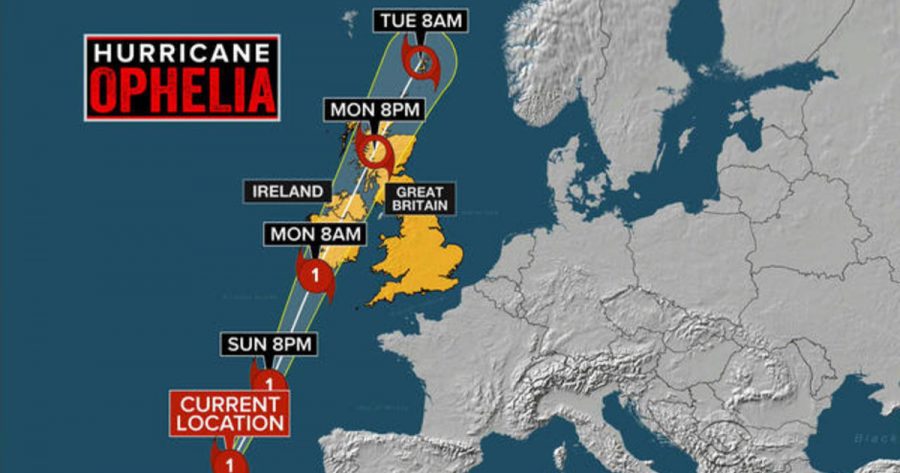Oh, Ophelia: Global Warming’s Effect on Hurricanes
October 30, 2017
Hurricane Ophelia is the latest storm to strike during this near record-breaking hurricane season. What sets it apart is that it formed in the Eastern Atlantic Ocean and moved its way up towards Ireland, which is rare for powerful storms. What conditions existed to fuel Ophelia enough to cause the enormous damage it did in Ireland?
The last time a significant storm hit Ireland was Hurricane Debbie in 1961. The Emerald Isle experiences tropical storms and depressions often, but it is rare for a storm to maintain hurricane strength through the colder waters near Europe long enough to hit land with staggering wind speeds. Dann Mitchell of the University of Bristol in the UK claims that more and more storms will continue to reach Western Europe in the coming years and that their wind speeds will “be enhanced in the future due to human-induced climate change.” It has been a common theme in the news cycle that our ecological footprint has consequences; in terms of hurricanes, the effects of global warming could cause billions of dollars in damages as it will affect not only European Nations but coastal areas worldwide. The warming waters provide more favorable conditions for hurricane formation, so as the waters continue to heat up over the next few years, the number of hurricanes will increase.
This will affect any area currently experiencing hurricanes because they will continue to increase in power, which is the reason that we hear of breaking hurricane records each year. According to meteorologist David Roth of the National Oceanic and Atmospheric Administration (NOAA), Hurricane Harvey broke the record for the most rainfall from a hurricane in the United States, reaching just over 60 inches in some places. This occurred within two months of Hurricane Ophelia and kicked off the record breaking season. Just a week later, Phil Klotzbach of Colorado State University noted that Hurricane Irma broke the record for the longest amount of time maintaining such high speed winds for any Atlantic storm. He also studied Hurricane Ophelia in early October, deeming it “the strongest Atlantic hurricane on record so far east” in such a late time of the year.
Despite being completely caught off guard, fatalities were thankfully minimal, yet of course tremendously important, as three people died due to Ophelia. Ireland’s Electricity Board said that 360,000 homes and businesses were hit with power outages, but it was not expected to last more than a few days. Flooding, debris damage, and roofs ripped off were the most common problems reported from the storm. It could have been a lot worse; hopefully the storms that hit the area in the next few years will not cause more damage as they grow stronger and more frequent due to our rapidly changing climate.


















